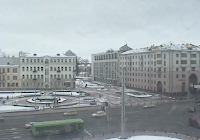Your Alzheimer's donation will help billions live without it. Donate online now
The impact of the amyloid plaques that appear in the brains of patients with Alzheimer's disease may extend beyond the deposits' effects on neurons - the cells that transmit electrochemical signals throughout the nervous system. In an article in the Feb. 27 issue of Science, researchers from the MassGeneral Institute for Neurodegenerative Disease (MGH-MIND) report that amyloid plaques may also increase the activity of astrocytes, star-shaped nervous system cells traditionally considered to provide a supporting role in normal brain function. They also show that amyloid-induced astrocyte hyperactivity extends throughout the brain rather than being confined to regions directly adjacent to plaques.
"Our work suggests that amyloid plaques might have a more complex role in altering brain function than we had thought," says Kishore Kuchibhotla of MGH-MIND, lead author of the Science article. "Plaques develop rapidly and have been shown to cause relatively acute, localized neuro-toxicity. We show that astrocytes could provide a network mechanism that may stretch the impact of plaques to more distant areas of the brain."
Astrocytes were long considered to provide passive support to neurons, but in the early 1990s it was discovered in cell culture that they also could transmit signals by means of transient increases in calcium levels that move from cell to cell in a wave-like manner. These calcium waves travel relatively long distances in response to a variety of external stimuli. Since astrocytes are so abundant - making up about half the volume of the brain - and found throughout the brain, the MGH investigators hypothesized that their function may also be affected by the presence of amyloid plaques.
Using cutting-edge imaging techniques that give a real-time view of the activity of brain cells in living mice, the investigators labeled astrocytes with a dye that lights up when a cell is active and shuts off when it is not. They were surprised to see astrocytes flicker on and off at much higher rates in transgenic mice with an abundance of plaques than in plaque-free animals. The plaque-associated astrocyte activity appeared to be synchronized and passed to distant areas of the brain in a wave-like fashion. Another imaging technology revealed that resting calcium levels were elevated throughout the astrocyte network of animals with plaques but not in normal mice. Blocking the activity of neurons did not reduce astrocyte activity, indicating that amyloid's known impact on neuronal activity was not responsible for its apparent effects on astrocytes.
"This is the first clear evidence in a live animal model that amyloid plaques perturb calcium signaling across the astrocyte network via a neuron-independent mechanism," says Kuchibhotla. "It has been suggested that these intercellular calcium waves, which previously had been observed only in response to some sort of external stimulus, indicate the existence of or response to a traumatic insult. Our data support this hypothesis, but whether the calcium signals we observed actually protect or harm cells remains to be determined.
"We've only begun to scratch the surface of how plaque deposition impacts astrocyte function," he adds. "One key question will be how increased astrocyte signaling impacts neuronal function, and another will be whether astrocyte activity limits or intensifies plaque deposition." ...http://www.medicalnewstoday.com
Broccoli sprouts may reduce asthma
A naturally occurring compound in broccoli and other cruciferous vegetables may help protect against asthma and other conditions due to respiratory inflammation, says a new study. ...http://www.nutraingredients.com
Слухаць Радыё Беларуь
Студэнт мінскага ВНУ Дзімітрый Саўчын сабраў кубік Рубіка за рэкордны час |
 2 сакавіка, Мінск /Юлия Ванина - БЕЛТА/. У Мінску ў першыню ў гісторыі Беларусі адбыліся спаборніцтвы па хуткаснай зборцы кубіка Рубіка. ДАЛЕЙ 2 сакавіка, Мінск /Юлия Ванина - БЕЛТА/. У Мінску ў першыню ў гісторыі Беларусі адбыліся спаборніцтвы па хуткаснай зборцы кубіка Рубіка. ДАЛЕЙ |








0 Comments:
Post a Comment
Subscribe to Post Comments [Atom]
<< Home